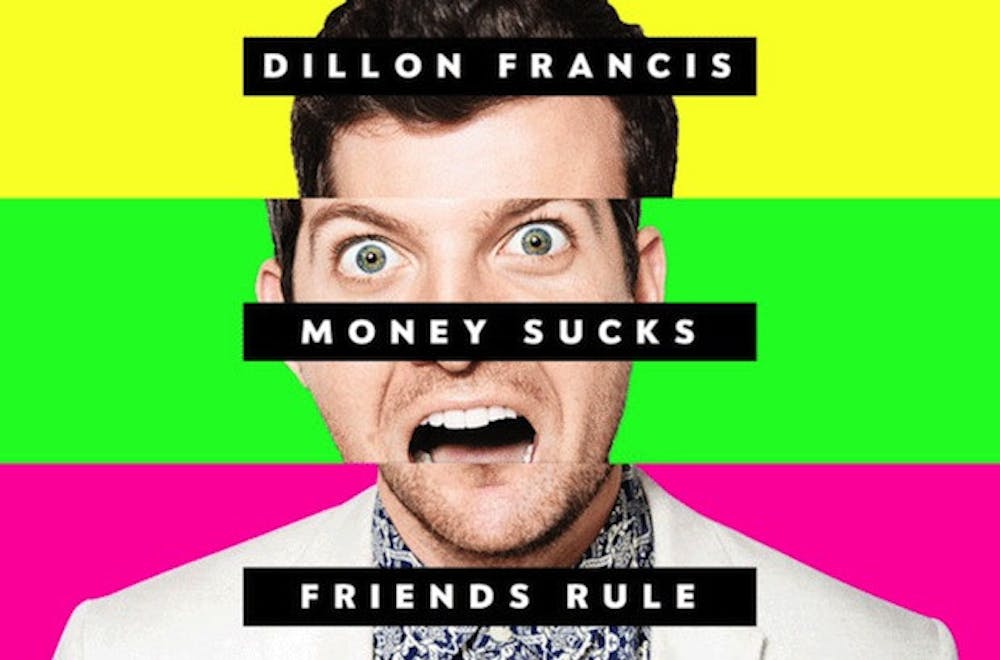Released 10/28
3/7 stars
Next to the Calvin Harris LP Motion, Money Sucks, Friends Rule will enjoy the most mainstream attention of any electronic music release in 2014. This is a huge deal most notably because the 27-year-old doesn’t fit the mold of a usual mainstream “EDM” success story. He became a mainstay at Mad Decent through his incredibly raw remixes and innovations in moombahton, a reggaeton infused brand of Dutch house whose byproduct has become synonymous with twerking. Francis is also rather good at the Internet. His multiple personas (DJ Hanzel, DJ Rich as F**k, Rave Dad), viral videos and in general his constant fan interaction over social media, much like Mac Demraco, have brought him a huge internet following making Francis electronic music’s perfect superstar in the smartphone world we live in.
This is why MSFR was such a pivotal album for Francis, after building a steady following and becoming one of the world’s most popular DJ/producers he had finally been thrust into a spotlight for the masses with a full-length major label release.
The album starts off with a 100 syllable per second verse from rap veteran Twista. The drop after Twista’s second verse, fluidly guides all the testosterone coming from the excessive chorus (“Hella women, hella bottles poppin’ we got all that”) into a head-bopping outro. The album is then thrust into “Get Low”, the DJ Snake collaboration that dominated this summers’ festival scene. The Arabic synth and classic DJ Snake snare pop, make it easy to understand why it was the lead single off of MSFR.
Then comes “When We Were Young”.
The electro pop anthem fits in a category with a slew of other tracks on the album where Francis delves into a realm of music that seems perfectly suited for the candy bracelet, knee-high fur boots clad girls and neon tank-top wearing bros who populate so many festivals. We’ve seen Francis delve into electro pop before with last year's standout T.E.E.D. collaboration “Without You” but whereas “Without You” captures the listener with a compelling lyrical storyline, “Drunk All the Time”, “Hurricane” and “We Are Impossible” get underwhelming vocal spots, both sonically and lyrically, from all collaborators involved.
This is a narrative is prevalent throughout the album but is no more blatant than on “Love in the Middle of a Firefight”. Brandon Urie, front man of The Panic at the Disco, delivers a Warped Tour ready vocal on a bed of bright, non-aggressive synths that never take control of the song.
Compare the difference for yourself
It comes as an enormous shift from one of the pioneers of Moombahton, which has been one of the most original, raw sounding trends in modern electronic music.
Even in his attempts at the type of music he’s gained a great deal of praise for, Francis never seems to take form in the way he has in previous triumphs.
“Not Butter” and “I Can’t Take It” are both solid tracks and the transformative vocal in the latter hits especially hard when it’s pitched up into a soulful scream. Both drops are undeniably heavy and with their successive order on the album, the listener receives what most Francis fans thought the album would sound like as a whole.
While the Martin Garrix collaboration “Set Me Free” contains the rawest sounds on the album, “We Make It Bounce” is the album’s best song.
"We Make It Bounce" finds Francis at his best, when he’s working within the genre he practically helped found. Major Lazer makes the most sense of any co-collaborator on the album and Stylo G provides a vocal which captures the ass-shaking essence of Moombahton. That’s why this song pays off in such a big way, it’s an effortless Caribbean-infused track within an album of miscalculated electro anthems.
MSFR has its bright spots, but ultimately its major ambitions do not pay off and Francis feels lost in a genre that he has seldom been a part of in the past. The album’s countless weak guest vocal appearances and the album’s general lack of raw emotion make this a very underwhelming debut LP for Francis. While he remains one of the world’s best DJ/producers, Francis needs to embark on a project that showcases the style of music that he has previously thrived in.





